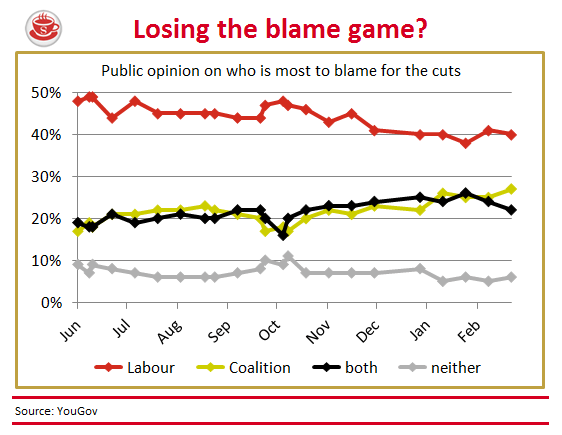It’s a point that I’ve made before, but here it is again: Budgets don’t tend to shift opinion polls, at least not the headline numbers. But opinion polls can give some insight into how Budgetary decisions will go down with the public. So by way of a catch-up with some recent polls, and ahead of tomorrow’s Main Event, I thought CoffeeHousers might appreciate a quick overview of public opinion on matters fiscal. Here goes…
1) Who’s to blame? When it comes to the overall flow of British politics, the question of who’s to blame for the cuts carries clear — and dangerous — implications. This graph of YouGov findings suggests that the coalition is catching more and more of the flak, and Labour less of it:

Although a recent Ipsos-MORI poll — which gave their respondents more choices of who, or what, to blame — had it different:

2) Are the coalition doing a good job? Much polling data here, and some of it contradictory. For the most part, it’s not great for the coalition. For instance, ComRes found that 58 per cent of the public agree with Labour’s line that the government is cutting too much, too fast. An Ipsos-MORI poll had 55 per cent of respondents saying that the government is making the wrong decisions. And then there’s this trend, which emerges out of the YouGov polling:

Despite all that, though, there is a general reluctance to support Labour’s approach. Ipsos-MORI’s latest survey has Labour trailing 28-31 to the Tories when it comes to which party has the best economic policies. Similarly, ComRes have Osborne and Cameron well ahead of Balls and Miliband on the issue of economic trust.
Quite how the poll that had Ed Balls as the “most capable” option as Chancellor fits in, I’m not sure.
3) Fuel and all that. Some of the most eye-catching polling has been done around fuel prices. It’s striking enough that ComRes have 81 per cent support for scrapping the 1p rise in fuel duty, while 77 per cent also say that this wouldn’t go far enough. But how about this: 49 per cent of people claim that they would “seriously consider” switching their vote to a party that took unequivocal action on fuel costs. Bravado, perhaps. But a reminder, nonetheless, of the importance of petrol in politics.






Comments